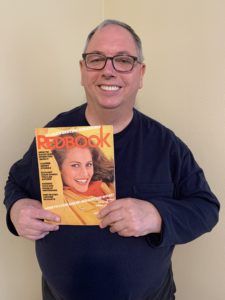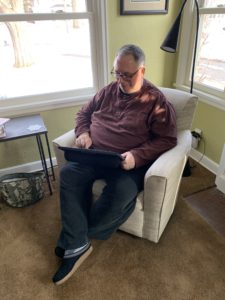
I was one of several dads featured in an article called “Fathers who are good at mothering” in the May 1982 issue of RedBook Magazine. RedBook had a circulation of about 2.3 million per month back then.
The issue was published in late April. However, a couple of weeks later on May 13, 1982, when Maria was born, the article was still on the bulletin board in the maternity ward. Pro tip: When your spouse is in hard labor, focus on her and not the conversation with the nurse about the article. Just saying.
I ended up in RedBook because the family psychologist who was the instructor at a fathering class was contacted by RedBook for a recommendation of someone they should interview. He suggested they contact me.
When Betsy, Maria’s older sister by two years, was a couple of weeks old, Betsy and I attended a Fathering Class in the big first-floor meeting room in St Joseph’s hospital. We and about 18 other fathers/infant teams met on Saturday mornings for three weeks. During the third class, the instructor said his kid was getting too old to be considered an infant so he asked for a volunteer to help demonstrate stuff for the next session. I volunteered. Betsy was only about 2-months old and didn’t seem to mind.
We, Betsy and I, assisted for about six or seven sessions (three classes per session). A couple of weeks after Maria was born, she replaced Betsy as the demonstration baby. Maria and I did about five sessions of three classes each.
As I write this post, the “Hop! Hop! Hop!” song we sang at the Fathering Class has been running on a loop in my head. We held the baby facing us, making sure we supported the baby’s head. We would gently bounce and quietly sing this song in our normal tone:
Hop! hop! hop!
Hop my pony hop.
Though the road is rough and stony
Hop-along my little pony
Nibble as a top
Hop and never stop
I probably sang this to Betsy and Maria hundreds of times and was always rewarded with a smile.
It was wonderful being present for the birth of both girls. I remember how focused and worried we were about the birth itself. The delivery is intense, but when it is over, I am their dad for the rest of my life.
The class was to help dads be more comfortable with their new infant. Back then, family dynamics were changing. Unlike our parents’ generation, in my generation, both mom and dad often had a job. We dads needed to be much more involved in the day-to-day care of our kids than our fathers were. This class was there to help us dads learn to be fathers who were good at mothering.
A primary requirement for the fathering class was that the dads bring their babies to the class by themselves. The first time I had Betsy alone outside the house was when I took her to that class by myself. It was sort of scary. But Betsy and I got along pretty well.
I was shocked when I got to that first class. Most of the moms had accompanied the dad. The instructor brandished the moms from the room. Then he closed the curtains because the moms were gathered at the windows. These moms had never been separated from their babies. Both mom and dad needed to know, dad could be trusted with the baby.
By the time Maria was helping in the Fathering Class, most of the dads came to class that first day alone. Expectations changed. Doctors, nurses, and recent parents with young kids began to encourage new parents to give each other a break by taking care of the infant alone. The parents were learning to trust each other’s ability to care for the baby.
I don’t remember how it was arranged. The day after Maria was born, an exhausted me was interviewed in the hospital cafeteria by the author of the article and another lady for about an hour. As far as I know, the follow-up article was not written. I was also contacted by the producer of one of the local talk shows but there were no dates that worked for me to be on a show.
Please know, I was not some super dad. I think I was a good dad but not even in the same class of good that I see many dads are today. I think my generation bumped up the bar on what it means to be a more nurturing dad. But this current generation has taken being a nurturing dad to a whole new level of good.
Here are the few paragraphs about me from RedBook Magazine May 1982:
….. ”I can’t imagine how I could have had the same kind of attachment to my child without having changed her diapers or got up for her in the middle of the night.” says Paul Leegard, 29, of St Paul, Minnesota. He recalls: “I had heard so much about bonding at the moment of birth that I absolutely had to be there. It was a wonderful moment. I’ve talked to fathers who were in the waiting room while their wives were delivering, and when they went to the nursery they said, “I wonder which one is mine.” When you’re there for their birth, there is no doubt which one is yours. Our baby was alert and I was elated.”
Paul, a personnel manager for White Farm Equipment Company in St. Paul, is one of the new breed of fathers who attended Lamaze classes and the delivery of his daughter Betsy more than two years ago. He considers himself an equal parent, although he is quick to admit that his parenting time has been limited by the demands of his full-time job. His wife Linda, 28, who shares a secretarial job with another woman and spends the rest of the time at home with Betsy, by necessity she does more of the housework and child care.
Nevertheless, Paul says he does not shy away from getting up at 3 A.M. when the baby cries. “Betsy woke up at three the other morning and I couldn’t get her back to sleep till six,” he recalls. “I was annoyed at the time, but in the long run, sharing responsibility is neat.”
Paul travels around the country recruiting personnel for his company and reports that he hasn’t met a man under 35 who’s not interested in helping with the children. “I want to say, I helped bring up my child.” Paul says, “If she turns out rotten, I’ll share the blame, but if she turns out good, I’ll share the credit. And I have a sneaking suspicion I’ll share the credit. “
The closer you look the more you see.
 In the fourth or fifth grade, as a geography lesson, we drew flags from the countries of our nationality. I drew Swedish and Norwegian flags. Mom’s side, Swedish. Dad’s side, Norweigan. Over the years, my guess is I have been asked my nationality hundreds of times. Maybe thousands of times.
In the fourth or fifth grade, as a geography lesson, we drew flags from the countries of our nationality. I drew Swedish and Norwegian flags. Mom’s side, Swedish. Dad’s side, Norweigan. Over the years, my guess is I have been asked my nationality hundreds of times. Maybe thousands of times.  Let us pretend a kid wants me to play trucks. I probably would politely say no because crawling around in the sand takes a bigger commitment at my age than I am willing to commit to. I can make engine noises and push a truck with the best of them. However, crawling around in the sand actually would be tough.
Let us pretend a kid wants me to play trucks. I probably would politely say no because crawling around in the sand takes a bigger commitment at my age than I am willing to commit to. I can make engine noises and push a truck with the best of them. However, crawling around in the sand actually would be tough.